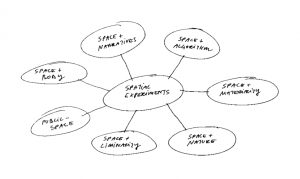— This is an archival page, to view the current MAST Course at Graz Technical University (2019/20) follow here —
COURSE NAME: Spatial Design Challenge
Workshop MAST 2019 Space Material Detail
SHORT SUMMARY
In a world of systemic crisis, with an apparent need for coexistence, conviviality and new ways of acting, the MAST project sets sails to explore alternative routes for a better living. Fostering ideas around the future worker’s identity the participants will reflect and build on own change-stimulating personal and social skills, both as leaders and creators within cultural industries.
 For MAST the Institute for Spatial Design of the TUGraz assumes the “Spatial Design Challenge”, which consist on a series of process-oriented site-specific courses with different subjects that will lead the MAST students though spatial experiments — during these labs, Gestures in Public Space or interventions are generated. These space laboratories are formed on the interstice of transdisciplinarity, fostering in each case a different constellation of AST partners. Subjects as Space and Body, Space and Narrative, Space and Algorithms, Space and Materiality, Space and Nature, Liminal Space and Public Space will be use, in solitary or as cluster, in the development of each of the experiments.
For MAST the Institute for Spatial Design of the TUGraz assumes the “Spatial Design Challenge”, which consist on a series of process-oriented site-specific courses with different subjects that will lead the MAST students though spatial experiments — during these labs, Gestures in Public Space or interventions are generated. These space laboratories are formed on the interstice of transdisciplinarity, fostering in each case a different constellation of AST partners. Subjects as Space and Body, Space and Narrative, Space and Algorithms, Space and Materiality, Space and Nature, Liminal Space and Public Space will be use, in solitary or as cluster, in the development of each of the experiments.
Besides experimentation as a basic method of research — that supports the unexpected, focus on process and allows failure to happen, our focus is in social sustainability, methods of communication and translation and conviviality. Behind is the pursue to answer the question: How do we want to live (work) together?
A basic precondition for all experiments is liminality, specifically the development of experiences around Liminal Spaces — transitional spaces are existing urban environments that show tensions among users and towards their relation to space. They represent zones within different social milieus, antagonist geographical topographies, architectural and urban discrepancies with diverse political claims. Liminal spaces are highly ambivalent: they are not used by people in the way that architects and urban designers have planned them. This particular approach to liminal sites where technology, urbanism, architecture and art come together with sensitive cartography has a significant impact in the future of the cityscape and its uses. It creates on one hand a system of approach for the art-students to liminal locations by using specific tools of research, and on the other, sets within the interventions site-specifically changes that act upon a more sustainable relation between communities and their environments.
Spatial Experiment I: MBody*
AIMS, METHODS AND CONTENT
The programme seeks to deploy tools for innovation and a (re)organisation of society, fostering transversal management as reflected within particular aspects of architecture, heritage, public space, participation, audience, public policy etc. By identifying tools and combining them around multidisciplinary solutions, the participants will come together to design possible solutions to timely questions or problems they encounter.
LEARNING OUTCOMES
PROGRAMME (SYLLABUS)
The first week of the workshop will be dedicated to define an Inquiry within the urban scape, develop a Solution, and then transfer it into the rural setting by developing, during the second week, a Project (Solution Statement and/or Pilot Action, Artwork etc.) At the crossing of Art, Science and/or Technology.
ASSESSMENT
Project and Experience 50%
Final Development 30%
Oral Presentation 20%
COURSE MATERIALS
Course Features
Location (Graz, Osor)
Duration (3 Weeks)
Workshop (7 Days)
Credit Value (4 Ects)
Language (English)
Level (Postgrad., Ma)
TEACHERS AND MENTORS
MAF Lic.Lic Nayari Castillo-Rutz (tugraz)
Dr.Franziska Hederer (tugraz)
Dr.Peter Purg (UNG)
CURRICULUM
As in the Unicult-MAST 2018 programme announcement:
https://www.unicult2020.com/classes/
Spatial Experiments II: DATA-ART-SCIENCE or from algorithms to space (On planning)
{Space and Algorithms} A cooperation being built between the Institute for Spatial Design TUGraz, IEM (Institute for electroacoustic music) -KUG Graz and the Institute for Structural Design – TUGraz
Programmed for ILE 5 in April 8.-12. 2019
Spatial Experiments III: The Sun Pavilion (On planning)
{Space and Nature} A collaboration starting with IEM (Institute for electroacoustic music) -KUG Graz, the faculty of Physics Karl Frazens University Graz and esc kunst labor and probably other or the same institute within the TU.
Programmed for ILE 11 in May 2020
